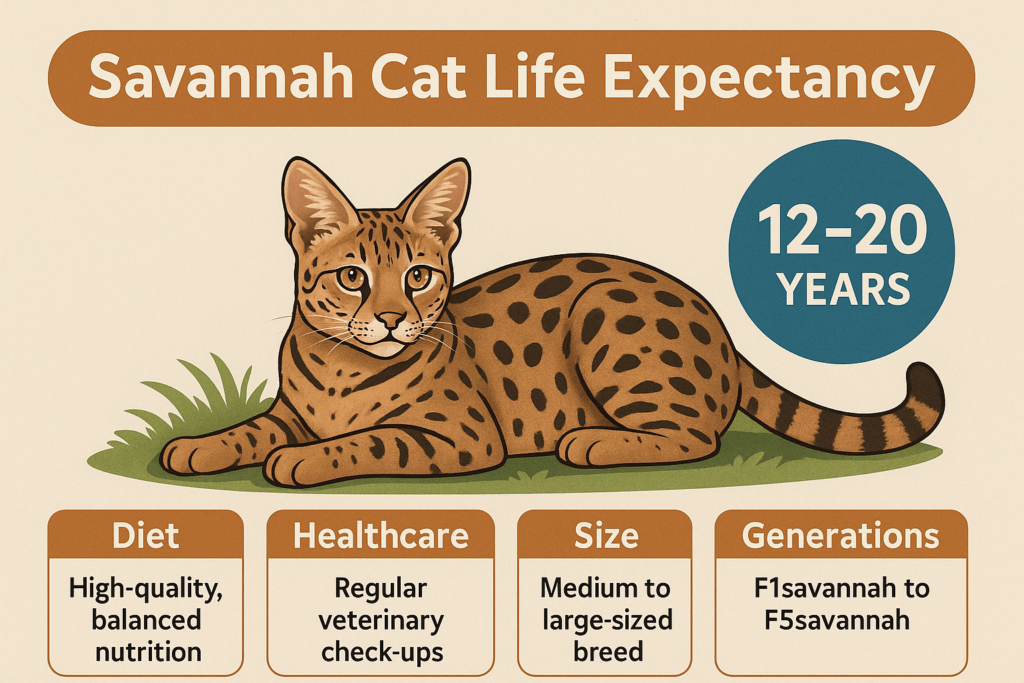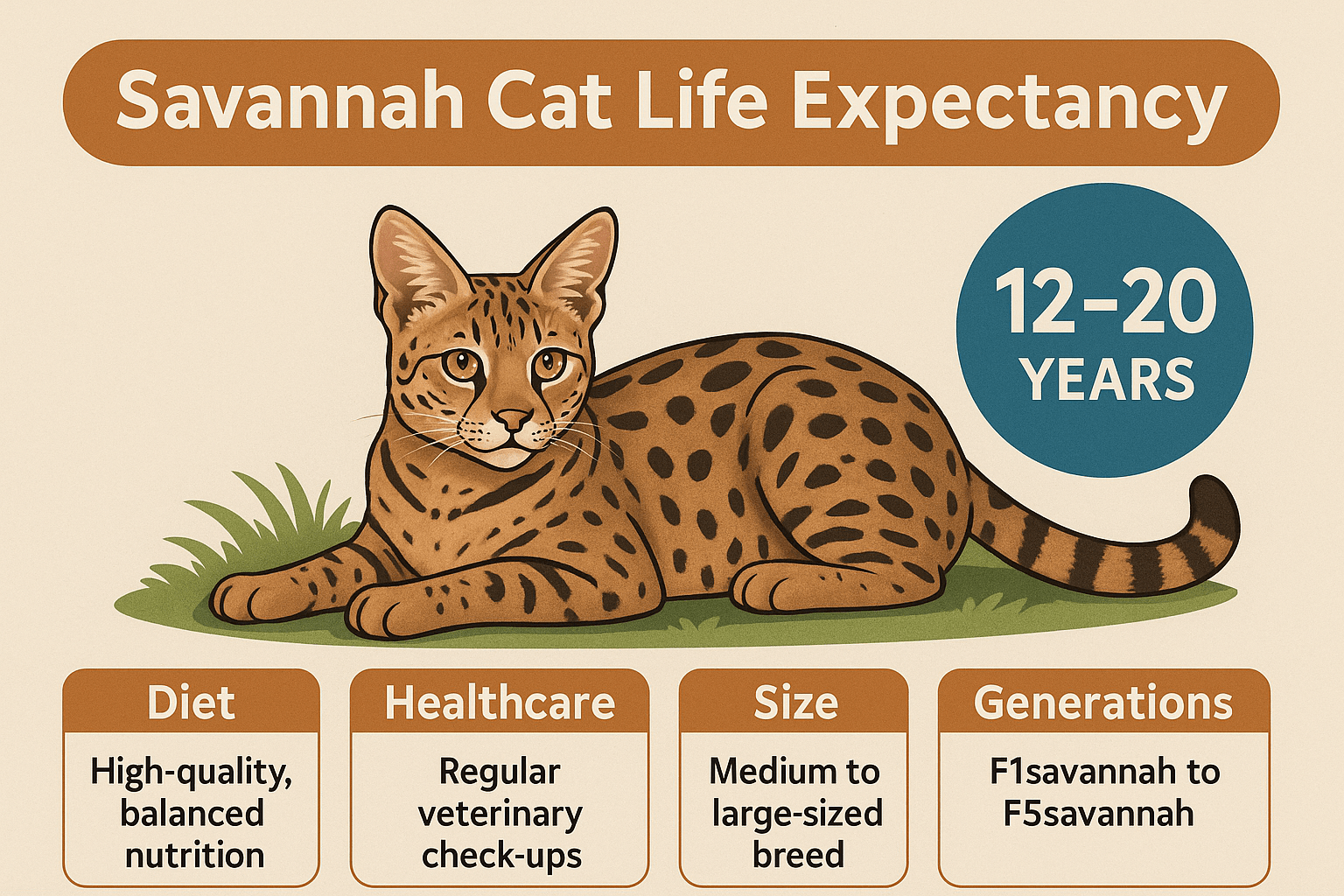Savannah Cat Life Expectancy: What You Need to Know
The Savannah cat, a striking hybrid breed known for its wild appearance and playful personality, has captured the hearts of cat enthusiasts worldwide. One of the most important aspects of caring for a Savannah cat is understanding their life expectancy and how to maximize their years of health and happiness. While these majestic felines are generally robust, their lifespan can vary based on genetics, care, and lifestyle.
In this blog post, we’ll explore the factors that influence a Savannah cat’s life expectancy, provide practical tips for ensuring their well-being, and answer common questions about this unique breed. Whether you’re a proud Savannah cat owner or considering adopting one, this guide will help you create the best possible life for your feline companion.
Factors Affecting Savannah Cat Life Expectancy
Several key factors contribute to how long a Savannah cat may live. Understanding these influences can help you take proactive steps to ensure your cat enjoys a long and healthy life.
Genetics and Breed Lineage:
The genetic makeup of a Savannah cat plays a significant role in determining their lifespan. Responsible breeding practices can reduce the risk of hereditary health issues.Diet and Nutrition:
A balanced, high-quality diet tailored to their needs supports overall health and longevity. Poor nutrition can lead to obesity and related conditions.Exercise and Mental Stimulation:
Savannah cats are highly active and intelligent. Providing ample opportunities for physical activity and mental engagement prevents boredom and promotes vitality.Veterinary Care:
Regular check-ups, vaccinations, and preventative treatments help catch potential health problems early, extending their lifespan.Living Environment:
A safe, stress-free home environment minimizes risks from accidents, toxins, or other hazards that could shorten their life.
By addressing these factors, you can significantly impact your Savannah cat’s quality of life and increase their chances of living a full, happy life.

Average Life Expectancy of a Savannah Cat
Savannah cats are known for their impressive lifespan compared to many other breeds. However, their exact life expectancy can vary depending on several elements. Here’s what you need to know about their typical longevity.
General Lifespan Range:
On average, Savannah cats live between 12 and 20 years, with proper care being a critical factor in reaching the upper end of this range.F1 vs. Later Generations:
F1 Savannah cats (first-generation hybrids) may have slightly shorter lifespans due to their larger size and unique genetic makeup, while later generations often live longer.Size and Health Considerations:
Larger Savannah cats, such as F1s, may face more health challenges than smaller generations, impacting their life expectancy.Comparison to Domestic Cats:
Savannah cats tend to live slightly longer than some domestic shorthair cats, thanks to their active lifestyles and robust genetics.Role of Owner Commitment:
Owners who invest time and resources into their cat’s health can significantly extend their lifespan beyond the average range.
Understanding these nuances helps set realistic expectations and highlights the importance of responsible ownership in maximizing your Savannah cat’s life expectancy.
Check this guide 👉Maine Coon Savannah Cat Mix: Best 7 Expert Tips!
Check this guide 👉Savannah Cat vs Bengal Cat: Best 7 Expert Tips!
Check this guide 👉Savannah Cat Diet: Best 7 Expert Tips!
Tips to Extend Savannah Cat Lifespan | Common Health Concerns to Monitor |
|---|---|
Provide a high-protein, nutrient-rich diet | Hypertrophic cardiomyopathy (heart disease) |
Schedule annual vet check-ups | Dental issues like gingivitis or tooth decay |
Create an enriching, stimulating environment | Obesity due to overfeeding or lack of exercise |
Keep them indoors to avoid accidents | Joint problems in larger Savannah cats |
Maintain a stress-free living space | Allergies to food or environmental triggers |
How to Promote Longevity in Your Savannah Cat
Taking proactive steps to care for your Savannah cat can make a world of difference in their life expectancy. Here are some actionable tips to keep your feline friend thriving for years to come.
Feed a Species-Appropriate Diet:
Choose high-quality cat food rich in animal protein and low in fillers to meet their nutritional needs.Encourage Daily Exercise:
Engage your Savannah cat in interactive play sessions to burn off energy and maintain a healthy weight.Prioritize Preventative Healthcare:
Stay up-to-date with vaccinations, parasite control, and routine screenings to catch issues early.Provide Enrichment Activities:
Puzzle toys, climbing structures, and outdoor enclosures (catios) stimulate their curious minds and active bodies.Monitor Behavioral Changes:
Sudden shifts in appetite, activity level, or behavior can signal underlying health problems that require attention.
By implementing these strategies, you can create an environment where your Savannah cat thrives physically and emotionally.
Signs Your Savannah Cat Is Aging Gracefully
As your Savannah cat grows older, certain signs indicate they are aging well and maintaining good health. Recognizing these markers helps reassure you that your care efforts are paying off.
Maintaining a Healthy Weight:
A stable weight without excessive loss or gain suggests your cat’s diet and exercise routine are on track.Active and Playful Demeanor:
Older Savannah cats that remain energetic and engaged are likely in excellent physical condition.Shiny Coat and Clear Eyes:
A glossy coat and bright eyes reflect proper nutrition and overall vitality.Regular Eating and Drinking Habits:
Consistent appetite and hydration levels are indicators of good digestive and kidney health.Minimal Joint Stiffness:
If your cat moves comfortably without limping or hesitation, it shows their joints are in good shape.
These positive signs demonstrate that your Savannah cat is benefiting from your attentive care and living their best life.
Early Signs of Aging in Savannah Cats
As Savannah cats enter their senior years, subtle changes may indicate they are beginning to age. Recognizing these signs early allows you to adjust their care accordingly.
Decreased Energy Levels:
Older cats may sleep more and show less interest in vigorous play, signaling a natural decline in stamina.Changes in Coat Texture:
A once-sleek coat may become dull or thinner, requiring extra grooming and attention to skin health.Slower Movement:
Stiffness or reluctance to jump can suggest joint discomfort or arthritis, which may need veterinary intervention.Altered Eating Patterns:
Reduced appetite or difficulty chewing could point to dental issues or other health concerns.Increased Vocalization:
Some aging cats vocalize more due to sensory changes, anxiety, or underlying medical conditions.
Addressing these early signs ensures your Savannah cat remains comfortable and content as they grow older.
Fun Ways to Keep Your Savannah Cat Active
Keeping your Savannah cat physically and mentally stimulated is crucial for their health and happiness. These fun activities cater to their energetic nature and intelligence.
Interactive Laser Toys:
Laser pointers engage their hunting instincts and encourage bursts of running and jumping.Climbing Structures:
Tall cat trees or wall-mounted shelves allow them to climb and survey their territory like miniature leopards.Puzzle Feeders:
Food-dispensing toys challenge their problem-solving skills while slowing down mealtime.Outdoor Enclosures (Catios):
Safe outdoor spaces let them experience fresh air and sights without exposure to dangers.Training Sessions:
Teaching tricks or commands using positive reinforcement strengthens your bond and keeps their mind sharp.
Incorporating these activities ensures your Savannah cat stays entertained and physically fit.
Building a Strong Bond with Your Savannah Cat
A strong bond with your Savannah cat not only enhances their emotional well-being but also makes caregiving easier. These tips help deepen your connection over time.
Spend Quality Time Together:
Dedicate daily moments for cuddling, playing, or simply sitting near your cat to build trust.Learn Their Preferences:
Observe what foods, toys, or activities they enjoy most and incorporate them into your routine.Respect Their Independence:
Savannah cats value their autonomy; give them space when needed to foster mutual respect.Use Positive Reinforcement:
Reward good behavior with treats, praise, or affection to reinforce desirable habits.Communicate Through Body Language:
Pay attention to their tail movements, ear positions, and vocalizations to better understand their moods.
Building a strong bond ensures your Savannah cat feels secure, loved, and valued throughout their life.
Frequently Asked Questions About Savannah Cat Life Expectancy
What is the average lifespan of a Savannah cat?
Savannah cats typically live between 12 and 20 years, depending on genetics, care, and lifestyle.
Do F1 Savannah cats live shorter lives?
F1 Savannah cats may have slightly shorter lifespans due to their large size and unique genetic traits, but proper care can still ensure a long life.
How can I extend my Savannah cat’s lifespan?
Focus on nutrition, exercise, regular vet visits, and creating a safe, enriching environment to promote longevity.
What health issues should I watch for in Savannah cats?
Common concerns include heart disease, dental problems, obesity, and joint issues, especially in larger cats.
Can Savannah cats live indoors exclusively?
Yes, keeping them indoors reduces exposure to dangers like traffic, predators, and diseases, which can extend their lifespan.
Ensuring a Fulfilling Life for Your Savannah Cat
Understanding the factors that influence a Savannah cat’s life expectancy empowers you to provide the best possible care for your beloved pet. From offering a nutritious diet and plenty of exercise to staying vigilant about their health, every effort you make contributes to their happiness and longevity. By fostering a loving, enriching environment, you can enjoy many wonderful years with your Savannah cat, watching them thrive as the magnificent companions they are. Remember, a well-cared-for Savannah cat isn’t just a pet—they’re a cherished member of the family.
Dog Tapeworm Life Cycle: Best 7 Expert Tips! – Learn how tapeworms infect dogs, spot symptoms, and break the cycle with expert prevention strategies.
Anxious Cat Body Language: Best 7 Expert Tips! – Learn to spot signs of stress, understand triggers, and help your cat feel safe and relaxed.
Anxious Dog Body Language: Best 7 Expert Tips! – Learn to spot signs of anxiety, respond effectively, and help your dog feel safe and secure.
Is Breeding Dogs Bad? Best 7 Expert Tips! – Explore the ethics, benefits, and risks of dog breeding to make informed decisions for a better future.





